小学英语语法总结及讲解
小学常用英语语法知识点归纳总结
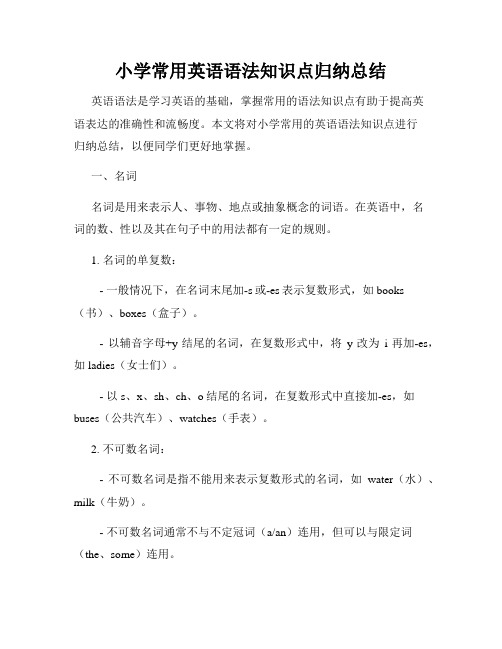
小学常用英语语法知识点归纳总结英语语法是学习英语的基础,掌握常用的语法知识点有助于提高英语表达的准确性和流畅度。
本文将对小学常用的英语语法知识点进行归纳总结,以便同学们更好地掌握。
一、名词名词是用来表示人、事物、地点或抽象概念的词语。
在英语中,名词的数、性以及其在句子中的用法都有一定的规则。
1. 名词的单复数:- 一般情况下,在名词末尾加-s或-es表示复数形式,如books (书)、boxes(盒子)。
- 以辅音字母+y结尾的名词,在复数形式中,将y改为i再加-es,如ladies(女士们)。
- 以s、x、sh、ch、o结尾的名词,在复数形式中直接加-es,如buses(公共汽车)、watches(手表)。
2. 不可数名词:- 不可数名词是指不能用来表示复数形式的名词,如water(水)、milk(牛奶)。
- 不可数名词通常不与不定冠词(a/an)连用,但可以与限定词(the、some)连用。
3. 可数名词和不可数名词的量词:- 可数名词可以与数字连用,而不可数名词一般不能直接与数字连用,需加上相应的量词,如a bottle of water(一瓶水)、 three cups of tea(三杯茶)。
二、代词代词是用来替代名词的词语,可以用来避免重复使用名词。
1. 主格代词和宾格代词:- 主格代词用于作主语,如I(我)、you(你)、he(他)、she (她)、it(它)等。
- 宾格代词用于作动词或介词的宾语,如me(我)、you(你)、him(他)、her(她)、it(它)等。
2. 物主代词:- 表示所有关系的物主代词有my(我的)、your(你的)、his (他的)、her(她的)、its(它的)等。
3. 反身代词:- 反身代词表示动作的反身或强调,如myself(我自己)、yourself(你自己)、himself(他自己)、herself(她自己)、itself (它自己)等。
三、动词动词在句子中表示动作、状态或存在。
小学英语语法形容词副词的用法总结整理归纳

小学英语语法形容词副词的用法总结整理归纳形容词是用来描述事物的特征和性质的词语,而副词则用来描述动作的方式、程度、时间等。
下面是小学英语形容词和副词的用法总结:形容词的用法:1. 形容词一般置于名词之前,用来修饰名词。
例如:a big house (一座大房子),a happy girl(一个快乐的女孩)。
2. 形容词可以用于比较级和最高级。
比较级用来比较两个事物的不同,最高级用来比较三个或以上事物的不同。
例如:This book is bigger than that one(这本书比那本大);He is the tallest boy in the class(他是班级里最高的男孩)。
3. 形容词可以和"be"动词连用,表示事物的状态或性质。
例如:She is beautiful(她很漂亮)。
副词的用法:1. 副词可以修饰动词,表示动作的方式、程度等。
例如:He runs quickly(他跑得很快)。
2. 副词可以修饰形容词,表示形容词程度的大小。
例如:She is very beautiful(她非常漂亮)。
3. 副词可以修饰其他副词,表示副词的程度。
例如:He reads quite slowly(他读得相当慢)。
4. 副词也可以修饰整个句子,表示说话人的态度或观点。
例如:Certainly, I will help you(当然,我会帮助你)。
需要注意的是,有一些形容词和副词的形式是相同的,需要根据具体情况来判断其词性。
同时,有些形容词和副词可以通过在词尾加上"-ly"来转化为副词形式。
小学英语语法一般现在时总结

小学英语语法一般现在时总结英语语法是英语知识中十分重要的环节,希望以下文章对您有所帮助!英语语法一英语中的时态一共有八种,它们是:一般现在时、现在进行时、一般过去时、现在完成时、一般将来时、过去进行时、过去完成时、过去将来时。
今天我们所要讲的就是第一种:一般现在时——表示一般性,经常性的动作或一般性事实。
1、含有be动词的句子He is a teacher.The girl is very beautiful.Tim and Jack are students.★变疑问句将be动词移到句首Is he a teacher?Is the girl very beautiful?Are Tim and Jack students?★变否定句在be动词后面加notHe is not a teacher.The girl is not very beautiful.Tim and Jack are not students.★肯定回答及否定回答Yes, he is. / No, he is not.Yes, she is. / No, she is not.Yes, they are. / No, they are not.英语语法二2、不含有be动词的句子,即含有一般动词的句子。
(1)第三人称单数及单数名词He likes books.She likes him.The dog likes bones.★变疑问句在句首加does, 动词变为原型Does he like books?Does she like him?Does the dog like bones?★变否定句在主语及动词之间加doesn't, 动词变为原型,原句中的动词不再有第三人称变化。
He doesn't like books.She doesn't like him.The dog doesn't like bones.★肯定回答及否定回答:Yes, he does. / No, he doesn't.Yes, she does. / No, she doesn'tYes, it does. / No, it doesn't.英语语法三注意:第三人称单数形式一般在动词后面加S,不要和名词复数混淆,变否定句或疑问句时名词复数没有任何变化。
小学英语语法专题知识总结

小学英语语法专题知识总结 小学英语语法是英语学习的基础,掌握好语法知识对于提高英语水平至关重要。以下是对小学英语语法专题知识的总结:
一、名词 名词分为可数名词和不可数名词。可数名词有单数和复数形式,如:apple(苹果)和apples(苹果们)。不可数名词通常没有复数形式,如:water(水)。
二、动词 动词是表示动作或状态的词。动词有现在时、过去时和将来时等时态。例如,现在时的walk(走)变为过去时是walked。
三、形容词 形容词用来描述名词,如:big(大的)、small(小的)。形容词的比较级和最高级形式分别表示比较和最高级,如:bigger(更大的)、biggest(最大的)。
四、副词 副词用来修饰动词、形容词或其他副词,表示方式、时间、地点等,如:quickly(快速地)、very(非常)。
五、代词 代词用来代替名词,避免重复,如:he(他)、she(她)、it(它)、they(他们)。
六、冠词 冠词用在名词前,表示特定的或不特定的事物,如:a(一个)、an(一个,用于元音开头的词前)、the(那个/这些)。 七、介词 介词用来表示名词与其它词的关系,如:in(在...里面)、on(在...上面)、at(在...地点)。
八、连词 连词用来连接词、短语或句子,如:and(和)、but(但是)、or(或者)。
九、数词 数词用来表示数目或顺序,如:one(一)、two(二)、first(第一)。
十、时态 英语中有多种时态,小学阶段主要学习现在时、过去时和将来时。现在时表示现在发生的动作或状态;过去时表示过去发生的动作或状态;将来时表示将来的动作或状态。
十一、句型结构 英语句子的基本结构为主语+谓语+宾语,如:I love apples(我喜欢苹果)。此外,还有疑问句、否定句等不同句型。
十二、疑问句 疑问句用来提出问题,通常以疑问词(如:who, what, where, when, why)开头,语序与陈述句不同。
小学英语语法形容词和副词详细讲解

形容词的用法
1)形容词在句子中通常放在名词前面,形 容词+名词,含有“······的”意思。如:
a clever boy 一个聪明的男孩 a blue car 一辆蓝色的汽车 注意:形容词在修饰someone, somebody,
something, anything, nothing等不定代词时, 需要置于其后。如: something important 重要的事情 nothing interesting没有什么有趣的事
2.I am very busy.(修饰形容词) 3.He runs too quickly .(修饰副词) 4.We play happily. (修饰动词)
⑤通常在形容词后加-ly变成副词。
slow → s_l_o_w__ly_ real → re_a_l_ly___
usual →u_s_u__a_ll_y careful→ca_r_e_f_u_l_ly easy →e_a_s_il_y__ happy→ha_p_p_i_ly__ heavy →h_e__a_v_il_y angry→an_g_r_i_ly__
星期日 星期一 星期二 星期三 星期四 星期五 星期六
always 100%
usually 75% often 50%
sometimes 25%
seldom 5%
never 0%
4)程度副词:表示程度的深浅
much 很,非常 very 非常
little很少
too 太
quite十分
5)疑问副词:用来引导一个特殊疑问 句。
用来修饰动词、形容词、其他副词,可表 示时间、地点、程度、状态等。如:
1The wind is blowing strongly.风刮的很大。 (副词strongly修饰动词blow,表示程度。)
小学英语语法汇总_学习总结_

小学英语语法汇总可数名词与不可数名词“分家”一、可数名词与不可数名词的区别普通名词所表示的人或事物是可以按个数计算的,这类名词叫可数名词。
可数名词分为个体名词(表示某类人或事物中的个体,如worker, farmer, desk, factory等)和集体名词(表示作为一个整体来看的一群人或一些事物,如people, family 等)。
如果普通名词所表示的事物是不能按个数来计算的,这类名词就叫不可数名词。
不可数名词分为物质名词(表示无法分为个体的物质,如meat, rice, water, milk, orange 等)和抽象名词(表示动作、状态、情况、品质等抽象概念,如work, homework, time, health, friendship等)。
二、可数名词的家务事可数名词有单数和复数两种形式。
指一个人或一件事物时,用单数形式;指两个或多个人或事物时用复数形式。
名词由单数形式变成复数形式的规则如下:1. 一般的名词词尾直接加-s 。
如:book → books room → roomshouse → houses day → days2. 以s, ss, ch, sh, x 结尾的名词,在词尾加-es 。
如:bus → buses glass → glasseswatch → watchesdish → dishes box → boxes3. 以"辅音字母+y"结尾的名词,要先将y改为i再加-es。
如:city → cities body → bodiesfactory → factories等等。
4. 以f 或fe 结尾的名词,要将f或fe改为v再加-es。
如:half → halves leaf → leavesknife → knives wife → wives5. 特例 [悄悄话:特例常常考,要记住。
]① child → children② man → men woman → womenpoliceman → policemen(规律:man → men)③ tomato → tomatoes potato → potatoes[悄悄话:初中英语以o 结尾的名词变复数时只有这两个词加-es,其余的当然加-s喽!如:photo → photos ]④ foot → feet tooth → teeth [悄悄话: oo变成ee。
(完整版)小学英语语法总结全集
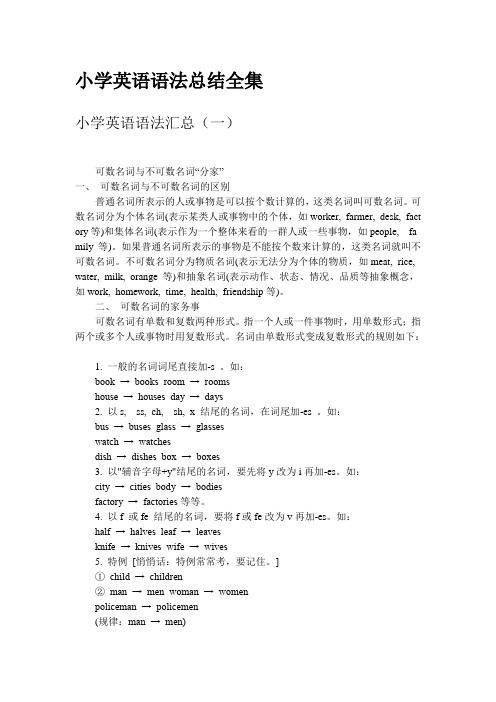
小学英语语法总结全集小学英语语法汇总(一)可数名词与不可数名词“分家”一、可数名词与不可数名词的区别普通名词所表示的人或事物是可以按个数计算的,这类名词叫可数名词。
可数名词分为个体名词(表示某类人或事物中的个体,如worker, farmer, desk, fact ory等)和集体名词(表示作为一个整体来看的一群人或一些事物,如people,fa mily 等)。
如果普通名词所表示的事物是不能按个数来计算的,这类名词就叫不可数名词。
不可数名词分为物质名词(表示无法分为个体的物质,如meat, rice, water, milk, orange 等)和抽象名词(表示动作、状态、情况、品质等抽象概念,如work, homework, time, health, friendship等)。
二、可数名词的家务事可数名词有单数和复数两种形式。
指一个人或一件事物时,用单数形式;指两个或多个人或事物时用复数形式。
名词由单数形式变成复数形式的规则如下:1. 一般的名词词尾直接加-s 。
如:book → books room → roomshouse → houses day → days2. 以s,ss, ch,sh, x 结尾的名词,在词尾加-es 。
如:bus → buses glass → glasseswatch → watchesdish → dishes box → boxes3. 以"辅音字母+y"结尾的名词,要先将y改为i再加-es。
如:city → cities body → bodiesfactory → factories等等。
4. 以f 或fe 结尾的名词,要将f或fe改为v再加-es。
如:half → halves leaf → leavesknife → knives wife → wives5. 特例[悄悄话:特例常常考,要记住。
]①child → children②man → men woman → womenpoliceman → policemen(规律:man → men)③tomato → tomatoespotato → potatoes[悄悄话:初中英语以o 结尾的名词变复数时只有这两个词加-es,其余的当然加-s喽!如:photo → photos ]④foot → feet tooth → teeth[悄悄话:oo变成ee。
小学英语语法讲解-There_be句型
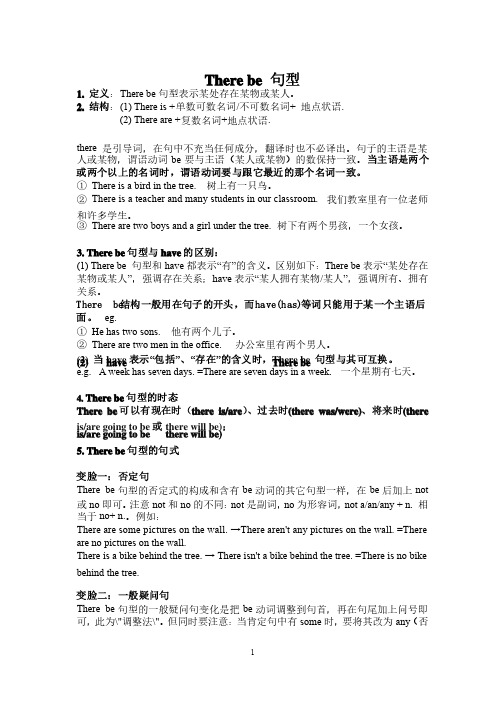
1There be 句型1. 定义:There be 句型表示某处存在某物或某人。
句型表示某处存在某物或某人。
2. 结构:(1) There is +单数可数名词/不可数名词+ 地点状语.(2) There are +复数名词+地点状语.there 是引导词,在句中不充当任何成分,翻译时也不必译出。
句子的主语是某人或某物,谓语动词be 要与主语(某人或某物)的数保持一致。
当主语是两个或两个以上的名词时,谓语动词要与跟它最近的那个名词一致。
① There is a bird in the tree. 树上有一只鸟。
树上有一只鸟。
②There is a teacher and many students in our classroom. 我们教室里有一位老师和许多学生。
和许多学生。
③ There are two boys and a girl under the tree. 树下有两个男孩,一个女孩。
树下有两个男孩,一个女孩。
3. There be 句型与have 的区别:(1) There be 句型和have 都表示“有”的含义。
区别如下:There be 表示“某处存在某物或某人”,强调存在关系;have 表示“某人拥有某物/某人”,强调所有、拥有关系。
关系。
There be 结构一般用在句子的开头,而have(has)等词只能用于某一个主语后面。
eg.① He has two sons. 他有两个儿子。
他有两个儿子。
② There are two men in the office. 办公室里有两个男人。
办公室里有两个男人。
(2) 当have 表示“包括”、“存在”的含义时,There be 句型与其可互换。
e.g. A week has seven days. =There are seven days in a week. 一个星期有七天。
4. There be 句型的时态 There be 可以有现在时(there is/are )、过去时(there was/were)、将来时(thereis/are going to be 或there will be);5. There be 句型的句式变脸一:否定句There be 句型的否定式的构成和含有be 动词的其它句型一样,在be 后加上not或no 即可。
小学英语语法总结大全

用法
I can swim. You should study hard.
动词时态
一般现在时
I go to school every day.
一般过去时
I went to the park yesterday.
现在进行时
I am playing football now.
可数名词与不可数名词
可数名词复数形式
books, cats, dogs
不可数名词
bread, water, milk
缩写形式
常见缩写
I'm, you're, he's, she's, it's, we're, they're, can't, isn't
冠词
不定冠词
a book, an apple
定冠词
be动词
基本形式
am, is, are
肯定句
I am a student. They are teachers.
否定句
I am not a student. They are not teachers.
一般疑问句
Are you a student? Is he a teacher?
情态动词
常见情态动词
小学英语语法总结大全
类别
语法点
示例及解释
人称代词
主格
I, you, he, she, it, we, they
宾格
me, you, him, her, it, us, them
物主代词
形容词性物主代词
my, your, his, her, its, our, their
小学英语语法知识点归纳与总结

小学英语语法知识点归纳与总结一、名词名词是英语中最基本的词类之一,它用来表示人、物、动物、地方等实际存在的事物。
名词的词形变化主要包括复数形式和所有格形式。
1. 单数和复数形式大多数名词形式加上-s或-es构成复数形式,例如:apple → apples,watch → watches。
2. 不规则复数名词形式一些名词的复数形式不规则,需要直接改变词形,例如:child → children,mouse → mice。
3. 所有格形式在表示所属关系时,名词通常加上-’s来构成所有格形式,例如:boy → boy’s,cat → cat’s。
二、代词代词是用来替代名词的词语,可以代替人、物、事物等。
代词分为人称代词、物主代词、指示代词和不定代词等。
1. 人称代词人称代词用来代替人或事物的名字,主要包括主格和宾格两种形式。
例如:I (主格)/ me(宾格),you(主格和宾格),he / him,she / her,we / us,they / them等。
2. 物主代词物主代词用来表示所属关系,表示某人或某物所拥有的事物。
例如:my,your,his,her,our,their等。
3. 指示代词指示代词用来指示人或事物的位置或距离。
例如:this,that,these,those等。
4. 不定代词不定代词用来表示不明确的人或物,例如:somebody,anybody,something,anything等。
三、动词动词是表示行动、状态或存在的词语。
英语动词的时态形式包括现在时、过去时和将来时。
1. 现在时表示现在或经常发生的动作或状态。
例如:I eat an apple every day.(我每天吃一个苹果。
)2. 过去时表示过去发生的动作或状态。
例如:She watched a movie last night.(昨晚她看了一部电影。
)3. 将来时表示将来将发生的动作或状态。
例如:We will go to the beach tomorrow.(明天我们将去海滩。
小学英语语法Be动词的用法归纳整理总结

小学语法—Be动词一、Be动词的形式Be动词的原形为:BeBe动词的一般现在时有三种形式,即:am is are(翻译为“是”“在”)Be动词的一般过去时有二种形式,即:was were(翻译为“是”“在”)二、Be动词的用法Be动词确切的说,它属于系动词(1)am is are与人称代词的搭配的用法Be的否定句就是在be后加not,下表是缩写,但是am not不能缩写人称一般现在时一般现在时主语汉语肯定否定主语汉语肯定否定第一人称I我am am not we我们are aren´t 第二人称you你are aren´t you你们are aren´t第三人称he他is isn´tthey他们are aren´t she她is isn´t她们it它is isn´t它们单三主语is isn´t复数主语are aren´teg:I am a student.我是个学生。
(I am可缩写成I´m)We are students.我们是学生。
(We are可缩写成We´re)You are twelve years old.你十二岁了。
(You are可缩写成You´re)They are at school.他们在学校。
(They are可缩写成They´re)She is my mother.她是我的妈妈。
(She is可缩写成She´s)He is my father.他是我的爸爸。
(He is可缩写成He´s)It is a book.它是一本书。
(It is可缩写成It´s)Be动词小口诀我(I)用am,你(you)用are。
is连着他(he),她(she),它(it)。
单数名词用is,复数名词全用are。
变疑问,往前提,句末问号莫忘弃。
(完整版)小学英语语法总结全集
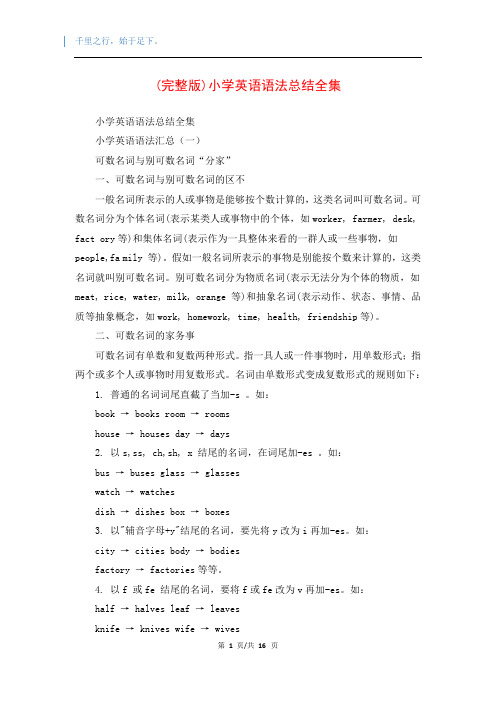
(完整版)小学英语语法总结全集小学英语语法总结全集小学英语语法汇总(一)可数名词与别可数名词“分家”一、可数名词与别可数名词的区不一般名词所表示的人或事物是能够按个数计算的,这类名词叫可数名词。
可数名词分为个体名词(表示某类人或事物中的个体,如worker, farmer, desk, fact ory等)和集体名词(表示作为一具整体来看的一群人或一些事物,如people,fa mily 等)。
假如一般名词所表示的事物是别能按个数来计算的,这类名词就叫别可数名词。
别可数名词分为物质名词(表示无法分为个体的物质,如meat, rice, water, milk, orange 等)和抽象名词(表示动作、状态、事情、品质等抽象概念,如work, homework, time, health, friendship等)。
二、可数名词的家务事可数名词有单数和复数两种形式。
指一具人或一件事物时,用单数形式;指两个或多个人或事物时用复数形式。
名词由单数形式变成复数形式的规则如下: 1. 普通的名词词尾直截了当加-s 。
如:book → books room → roomshouse → houses day → days2. 以s,ss, ch,sh, x 结尾的名词,在词尾加-es 。
如:bus → buses glass → glasseswatch → watchesdish → dishes box → boxes3. 以"辅音字母+y"结尾的名词,要先将y改为i再加-es。
如:city → cities body → bodiesfactory → factories等等。
4. 以f 或fe 结尾的名词,要将f或fe改为v再加-es。
如:half → halves leaf → leavesknife → knives wife → wives5. 特例[悄悄话:特例常常考,要记住。
小学英语语法形容词,副词的用法总结整理归纳

④ 程度副词一般放在形容词或副词之前。动词之前或者句尾。
eg: I study English very hard.我学习英语很努力。
I really like reading. 我真的喜欢看书。
She speaks English well.她英语说得很好。
⑤ 频度副词放在情态动词,be 动词,助动词的后面,实意动词的前面
分类
定义
简单形容词 由一个形容词单独构成
由几个形容词共同组成 合成形容词
并起形容词的作用
例词 nice green clever beautiful rainy long
ten-year-old(10 岁的) two-year(2 年的)
(2)副词的分类
分 定义
类
例词
时
now(现在),today(今天),yesterday(昨天),
friendly—friendlier,friendliest—more friendly,most friendly 3 形容词前加 less 和 least,则表示“较不”和“最不” 如:important 重要,less important 较不重要,least important 最不重要
五、形容词/副词的原级、比较级、最高级的用法 (1)原级的用法
① 肯定句中用“as+形容词/副词的原级+as”表示比较的两个对象在程度上相 同或相等。 eg: Tom is as tall as his brother.汤姆和他的哥哥一样高。
My hair is as long as yours. 我的头发与你的头发一样长。 Jack runs as fast as his brother. 杰克和他的哥哥跑得一样快。 ② 否定句中用“not so/as+形容词/副词的原级+as”表示“……不如……”。 eg: His bedroom is not so/as big as his sister´s. 他的房间不如他姐姐的大。 Lucy doesn´t dress so/as ely as Lily. 露西穿得不像莉莉那么可爱。 (2)比较级的用法(两者比较) ① “ A + 动词 + 形容词/副词比较级 + than + B”,意思为“A 比 B 更……”。
上海小学英语语法归纳总结
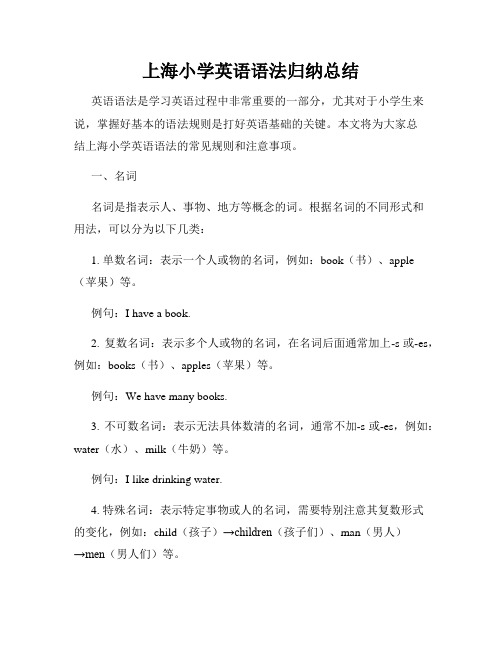
上海小学英语语法归纳总结英语语法是学习英语过程中非常重要的一部分,尤其对于小学生来说,掌握好基本的语法规则是打好英语基础的关键。
本文将为大家总结上海小学英语语法的常见规则和注意事项。
一、名词名词是指表示人、事物、地方等概念的词。
根据名词的不同形式和用法,可以分为以下几类:1. 单数名词:表示一个人或物的名词,例如:book(书)、apple(苹果)等。
例句:I have a book.2. 复数名词:表示多个人或物的名词,在名词后面通常加上-s或-es,例如:books(书)、apples(苹果)等。
例句:We have many books.3. 不可数名词:表示无法具体数清的名词,通常不加-s或-es,例如:water(水)、milk(牛奶)等。
例句:I like drinking water.4. 特殊名词:表示特定事物或人的名词,需要特别注意其复数形式的变化,例如:child(孩子)→children(孩子们)、man(男人)→men(男人们)等。
例句:There are many children in the park.二、代词代词用来代替名词,能够减少重复使用。
常见的代词包括:1. 主格代词:用于代替主语的代词,例如:I(我)、he(他)等。
例句:I am a student.2. 宾格代词:用于代替宾语的代词,例如:me(我)、him(他)等。
例句:The teacher is talking to me.3. 形容词性物主代词:表示所属关系的代词,例如:my(我的)、his(他的)等。
例句:This is my book.4. 名词性物主代词:用来代替名词的代词,例如:mine(我的)、hers(她的)等。
例句:This book is mine.三、动词动词是表示动作或状态的词,根据时态和语态的不同,可以分为以下几类:1. 一般现在时:表示经常发生的动作或状态,动词原形加-s或-es。
(完整版)小学英语语法总结全集
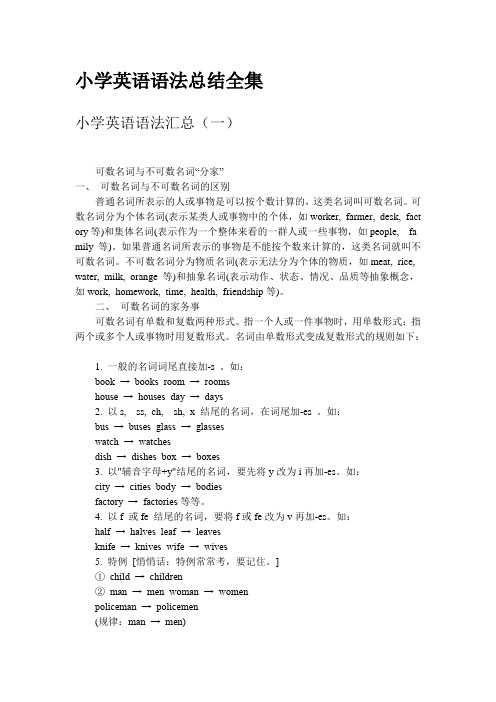
小学英语语法总结全集小学英语语法汇总(一)可数名词与不可数名词“分家”一、可数名词与不可数名词的区别普通名词所表示的人或事物是可以按个数计算的,这类名词叫可数名词。
可数名词分为个体名词(表示某类人或事物中的个体,如worker, farmer, desk, fact ory等)和集体名词(表示作为一个整体来看的一群人或一些事物,如people,fa mily 等)。
如果普通名词所表示的事物是不能按个数来计算的,这类名词就叫不可数名词。
不可数名词分为物质名词(表示无法分为个体的物质,如meat, rice, water, milk, orange 等)和抽象名词(表示动作、状态、情况、品质等抽象概念,如work, homework, time, health, friendship等)。
二、可数名词的家务事可数名词有单数和复数两种形式。
指一个人或一件事物时,用单数形式;指两个或多个人或事物时用复数形式。
名词由单数形式变成复数形式的规则如下:1. 一般的名词词尾直接加-s 。
如:book → books room → roomshouse → houses day → days2. 以s,ss, ch,sh, x 结尾的名词,在词尾加-es 。
如:bus → buses glass → glasseswatch → watchesdish → dishes box → boxes3. 以"辅音字母+y"结尾的名词,要先将y改为i再加-es。
如:city → cities body → bodiesfactory → factories等等。
4. 以f 或fe 结尾的名词,要将f或fe改为v再加-es。
如:half → halves leaf → leavesknife → knives wife → wives5. 特例[悄悄话:特例常常考,要记住。
]①child → children②man → men woman → womenpoliceman → policemen(规律:man → men)③tomato → tomatoespotato → potatoes[悄悄话:初中英语以o 结尾的名词变复数时只有这两个词加-es,其余的当然加-s喽!如:photo → photos ]④foot → feet tooth → teeth[悄悄话:oo变成ee。
小学be动词的英语语法知识讲解
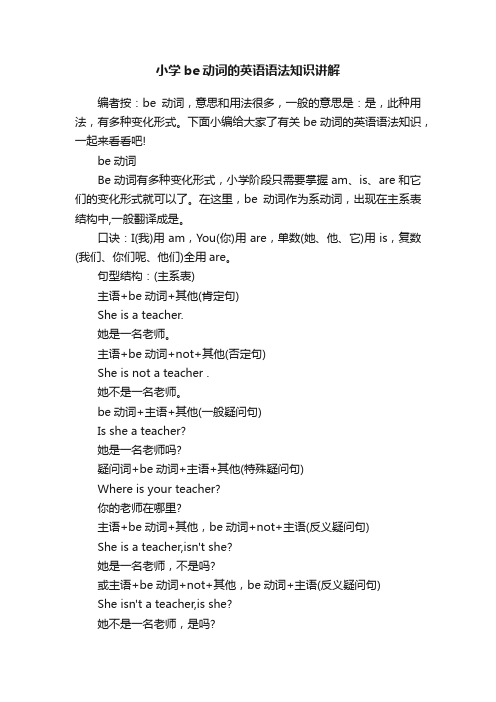
小学be动词的英语语法知识讲解编者按:be动词,意思和用法很多,一般的意思是:是,此种用法,有多种变化形式。
下面小编给大家了有关be动词的英语语法知识,一起来看看吧!be动词Be动词有多种变化形式,小学阶段只需要掌握am、is、are和它们的变化形式就可以了。
在这里,be动词作为系动词,出现在主系表结构中,一般翻译成是。
口诀:I(我)用am,You(你)用are,单数(她、他、它)用is,复数(我们、你们呢、他们)全用are。
句型结构:(主系表)主语+be动词+其他(肯定句)She is a teacher.她是一名老师。
主语+be动词+not+其他(否定句)She is not a teacher .她不是一名老师。
be动词+主语+其他(一般疑问句)Is she a teacher?她是一名老师吗?疑问词+be动词+主语+其他(特殊疑问句)Where is your teacher?你的老师在哪里?主语+be动词+其他,be动词+not+主语(反义疑问句)She is a teacher,isn't she?她是一名老师,不是吗?或主语+be动词+not+其他,be动词+主语(反义疑问句)She isn't a teacher,is she?她不是一名老师,是吗?10个句子轻松掌握be动词的用法Where is your book?你的书在哪里?Her sweater is pink.她的毛衣是粉色的。
I am a student.我是一名学生。
The book is in my schoolbag.这本书在我的书包里。
We were students five years ago. 五年前我们是学生。
Are you a worker?你是一名工人吗?Tom isn‘t at home.汤姆不在家。
My mother was a teacher last year. 我的妈妈去年是一名老师。
小学英语语法形容词,副词的用法总结整理归纳

eg:He is taller than me. 他比我高。
The girl is more beautiful than before. 这个女孩比以前漂亮多了。
Jack runs faster than his brother. 杰克跑得比他哥哥快。
②“which/who is + 形容词/副词比较级, A or B ?”
① 时间副词一般放在句尾或句首,有时可以放在动词前面。
eg: I often do exercises in the morning. 我经常在早上做操
Tomorrow many people will go for a picnic.明天很多人将要去野餐。
② 地点副词一般放在句尾,有时可以放在句首(如 here/there)。
always(一直),usually(通常),often(经常), sometimes(有时候)never(从不),once(一次), twice(两次)
疑
问
how(如何),where(在哪里),when(什么时候),
主要是用来构成特殊疑问句。
副
why(为什么)
词
三、形容词/副词的位置 (1)形容词的位置
意思为“A 和 B,哪一个更……”。
eg:which is bigger,the sun or the moon ?
哪一个更大,地球还是月亮?
Who is cleverer,Lily or Lucy ?
谁更聪明,莉莉还是露西?
③“the + 形容词比较级 + of + 名词”,意思为“两者之间较……的一个”。
小学语法—形容词和副词
一、形容词/副词的定义
形容词:用来修饰名词或者部分代词的词。形容词一般翻译成“……的” 副词:修饰动词、形容词、其他副词或全句的词,表明方式,时间,地点、程度 等。副词一般翻译成“……地/得” eg:She is a beautiful girl.他是一个漂亮的女孩。 (形容词修饰名词)
- 1、下载文档前请自行甄别文档内容的完整性,平台不提供额外的编辑、内容补充、找答案等附加服务。
- 2、"仅部分预览"的文档,不可在线预览部分如存在完整性等问题,可反馈申请退款(可完整预览的文档不适用该条件!)。
- 3、如文档侵犯您的权益,请联系客服反馈,我们会尽快为您处理(人工客服工作时间:9:00-18:30)。
小学英语语法总结及讲解一、一般现在时一般现在时基本用法介绍【No. 1】一般现在时的功能1.表示事物或人物的特征、状态。
如:The sky is blue.天空是蓝色的。
2.表示经常性或习惯性的动作。
如:I get up at six every day.我每天六点起床。
3.表示客观现实。
如:The earth goes around the sun.地球绕着太阳转。
一般现在时的构成1. be动词:主语+be(am,is,are)+其它。
如:I am a boy.我是一个男孩。
2.行为动词:主语+行为动词(+其它)。
如:We study English.我们学习英语。
当主语为第三人称单数(he, she,it)时,要在动词后加"-s"或"-es"。
如:Mary likes Chinese.玛丽喜欢汉语。
一般现在时的变化1. be动词的变化。
否定句:主语+ be + not +其它。
如:He is not a worker.他不是工人。
一般疑问句:Be +主语+其它。
如:-Are you a student? -Yes. I am. / No, I'm not.特殊疑问句:疑问词+一般疑问句。
如:Where is my bike?2.行为动词的变化。
否定句:主语+ don't( doesn't ) +动词原形(+其它)。
如:I don't like bread.当主语为第三人称单数时,要用doesn't构成否定句。
如:He doesn't often play. 一般疑问句:Do( Does ) +主语+动词原形+其它。
如:- Do you often play football? - Yes, I do. / No, I don't.当主语为第三人称单数时,要用does构成一般疑问句。
如: - Does she go to work by bike? - Yes, she does. / No, she doesn't.特殊疑问句:疑问词+一般疑问句。
如:How does your father go to work?动词+s的变化规则1.一般情况下,直接加-s,如:cook-cooks, milk-milks2.以s. x. sh. ch. o结尾,加-es,如:guess-guesses, wash-washes, watch-watches, go-goes 3.以“辅音字母+y”结尾,变y为i, 再加-es,如:study-studies二、现在进行时1.现在进行时表示现在正在进行或发生的动作,也可表示当前一段时间内的活动或现阶段正在进行的动作。
2.现在进行时的肯定句基本结构为be+动词ing.3.现在进行时的否定句在be后加not。
4.现在进行时的一般疑问句把be动词调到句首。
5.现在进行时的特殊疑问的基本结构为:疑问词+ be + 主语+ 动词ing?但疑问词当主语时其结构为:疑问词+ be + 动词ing?动词加ing的变化规则1.一般情况下,直接加ing,如:cook-cooking2.以不发音的e结尾,去e加ing,如:make-making, taste-tasting3.如果末尾是一个元音字母和一个辅音字母,双写末尾的辅音字母,再加ing,如:run-running, stop-stopping四、将来时理论及练习(一)、概念:表示将要发生的动作或存在的状态及打算、计划或准备做某事。
句中一般有以下时间状语:tomorrow, next day(week, month, year…),soon, the day after tomorrow(后天)等。
(二)、基本结构:①be going to + do;②will+ do.(三)、否定句:在be动词(am, is, are)l后加not或情态动词will后加not成won’t。
例如:I’m going to have a picnic this afternoon.→I’m not going to have a picnic this afternoon.(四)、一般疑问句:be或will提到句首,some改为any, and改为or,第一二人称互换。
例如:We are going to go on an outing this weekend. →Are you going to go on an outing this weekend?(五)、对划线部分提问。
一般情况,一般将来时的对划线部分有三种情况。
1. 问人。
Who例如:I’m going to New York soon. →Who’s going to New York soon.2. 问干什么。
What … do.例如:My father is going to watch a race with me this afternoon. → What is your father going to do with you this afternoon.3. 问什么时候。
When.例如:She’s going to go to bed at nine. →When is she going to bed?(六)、同义句:be going to = willI am going to go swimming tomorrow(明天). = I will go swimming tomorrow.五、一般过去时1.一般过去时表示过去某个时间发生的动作或存在的状态,常和表示过去的时间状语连用。
一般过去时也表示过去经常或反复发生的动作感谢。
2.Be动词在一般过去时中的变化:⑴am 和is在一般过去时中变为was。
(was not=wasn’t)⑵are在一般过去时中变为were。
(were not=weren’t)⑶带有was或were的句子,其否定、疑问的变化和is, am, are一样,即否定句在was或were后加not,一般疑问句把was或were调到句首。
3.句中没有be动词的一般过去时的句子否定句:didn’t +动词原形,如:Jim didn’t go home yesterday.一般疑问句:在句首加did,句子中的动词过去式变回原形。
如:Did Jim go home yesterday?特殊疑问句:⑴疑问词+did+主语+动词原形?如:What did Jim do yesterday?⑵疑问词当主语时:疑问词+动词过去式?如:Who went to home yesterday?动词过去式变化规则:1.一般在动词末尾加-ed,如:pull-pulled, cook-cooked2.结尾是e加d,如:taste-tasted3.末尾只有一个元音字母和一个辅音字母的重读闭音节,应双写末尾的辅音字母,再加-ed,如:stop-stopped4.以“辅音字母+y”结尾的,变y为i,再加-ed,如:study-studied5.不规则动词过去式:am,is-was, are-were, do-did, see-saw, say-said, give-gave, get-got, go-went, come-came,have-had, eat-ate, take-took, run-ran, sing-sang, put-put, make-made, read-read, write-wrote,draw-drew, drink-drank, fly-flew, ride-rode, speak-spoke, sweep-swept, swim-swam, sit-sat五、名词复数规则1.一般情况下,直接加-s,如:book-books, bag-bags, cat-cats, bed-beds2.以s. x. sh. ch结尾,加-es,如:bus-buses, box-boxes, brush-brushes, watch-watches 3.以“辅音字母+y”结尾,变y为i, 再加-es,如:family-families, strawberry-strawberries4.以“f或fe”结尾,变f或fe为v, 再加-es,如:knife-knives5.不规则名词复数:man-men, woman-women, policeman-policemen, policewoman-policewomen,mouse-mice ;child-children; foot-feet,; tooth-teeth fish-fish, people-people,Chinese-Chinese, Japanese-Japanese六、形容词和副词的比较级复习及练习(一)、形容词的比较级1、形容词比较级在句子中的运用:两个事物或人的比较用比较级,比较级后面一般带有单词than。
比较级前面可以用more, a little 来修饰表示程度。
than后的人称代词用主格(口语中可用宾格)。
2.形容词加er的规则:⑴一般在词尾加er ;⑵以字母e 结尾,加r ;⑶以一个元音字母和一个辅音字母结尾,应双写末尾的辅音字母,再加er ;⑷以“辅音字母+y”结尾,先把y变i,再加er 。
3.不规则形容词比较级:good-better, beautiful-more beautiful(二)、副词的比较级1.形容词与副词的区别(有be用形,有形用be;有动用副,有副用动)⑴在句子中形容词一般处于名词之前或be动词之后⑵副词在句子中最常见的是处于实义动词之后2.副词比较级的变化规则基本与形容词比较级相同(不规则变化:well-better, far-farther)七、There be 句型与have, has的区别1、There be 句型表示:在某地有某物(或人)2、在there be 句型中,主语是单数,be 动词用is ; 主语是复数,be 动词用are ;如有几件物品,be 动词根据最*近be 动词的那个名词决定。
3、there be 句型的否定句在be 动词后加not , 一般疑问句把be 动词调到句首。
4、there be句型与have(has) 的区别:there be 表示在某地有某物(或人);have(has) 表示某人拥有某物。
5、some 和any 在there be 句型中的运用:some 用于肯定句,any 用于否定句或疑问句。
6、and 和or 在there be句型中的运用:and 用于肯定句,or 用于否定句或疑问句。
